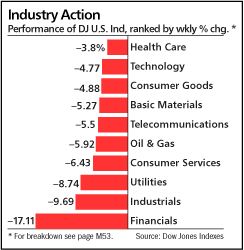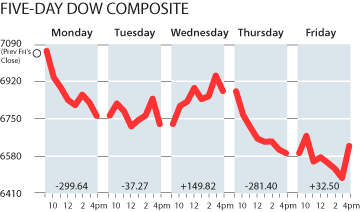From John Frankola
On Tuesday, WellPoint's (WLP) stock fell a whooping 28.3% as the company lowered guidance for the first quarter and full year. WellPoint reduced its EPS guidance for the first quarter to a range of $1.16 to $1.26, and its 2008 forecast to a range of $5.76 to $6.01. The mid-points of these ranges are about 16% and 8%, respectively, below WLP's previous guidance. The stock prices of other managed health care companies fell in sympathy. Aetna (AET), Coventry (CVH) and Unitedhealth (UNH) fell by 8.3%, 13.0% and 15.2%, respectively, on a day when the S&P 500 Index advanced 3.7%. WellPoint attributed the change in guidance to higher than expected medical costs, lower than expected fully insured enrollment and changing economic and regulatory environment.
Sell-side analysts were quick to reduce estimates, target prices and recommendations for WLP, as well as the other companies in the sector. On top of the reasons mentioned by the company, analysts are concerned that WellPoint's issues may signal the beginning of a cyclical downturn for the industry, which will be characterized by rising medical costs and competitive pricing. On top of these concerns, the managed care sector had already started to retreat as investors worried that a possible Democratic presidential victory could produce a more difficult regulatory environment.
From it 52-week high of 90.00 which occurred on January 8, WLP has declined 47% to its current price. It is now selling at just 8.0 times expected 2008 EPS. While sentiment has turned very negative on this sector, the current price level presents an attractive entry point for long-term investors. And while management has reduced guidance, they are still forecasting EPS growth of between 4% and 8% for 2008. (That doesn't seem like much of a cyclical downturn compared to other market sectors.)
Looking beyond the current weakness, WellPoint is well-position for long-term growth. It is the largest Blue Cross Blue Shield licensee, and with 35 million members, it is the largest managed care company in the U.S. when ranked by membership.
The managed care sector has a number of very attractive characteristics.
- There is an annuity aspect to the business - the vast majority of customers renew their coverage from year-to-year.
- After a number of years of industry consolidation, most geographic markets are now dominated by just two or three major competitors. This reduction in competition should keep pricing somewhat rational.
- The increased market share obtained industry leaders also gives the managed care companies more clout when negotiating fees paid for products and services.
- The size and scale which most companies have achieved present a barrier to entry for new competitors.
- With concern over rapidly rising healthcare costs, the managed care companies have strategically positioned themselves to be part of the healthcare cost solution. These companies realize their future success will depend on helping to control costs by forcing healthcare providers to be more efficient, providing products that give their members market incentives to control costs, and by making better use of information.
- Despite the current concern over a possible cyclical downturn, companies in this sector have historically demonstrated a high level of earnings and cash flow stability.
With the long-term fundamentals intact and a price/earnings ratio that is almost half that of the market, WLP looks to be a great value for long-term investors.
With the entire sector getting crushed in the wake of WellPoint's announcement, Aetna, Coventry and Unitedhealth also look attractive at current levels. All have a price/earnings ratio of 11 or less on 2008 EPS estimates. Aetna reiterated it guidance for 2008 this week, yet is trading 25% below its 52-week high. Coventry (down 31% from its 52-week high) could be an acquisition candidate at current price levels.
Its market cap is just $7 billion, compared to $21 billion, $47 billion and $26 billion, respectively, for Aetna, Unitedhealth and WellPoint. Unitedhealth (off 36% from its 52-week high) is the largest managed care company in terms of revenue and has the most diversified suite of products and services. Unitedhealth also made an announcement this week, recognizing some of the market's concerns, but stopping short of changing guidance.
Disclosure: Author owns a position in AET, CVH and WLP and manages accounts which hold AET, CVH, UNH and WLP.
Subscribe to:
Post Comments (Atom)


No comments:
Post a Comment